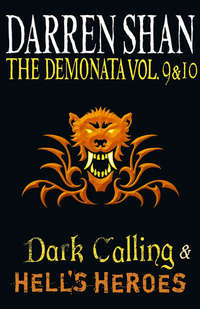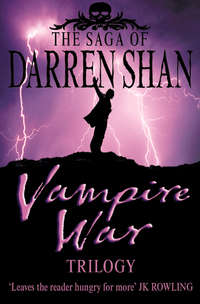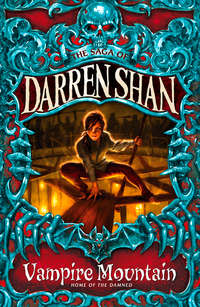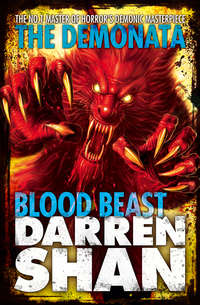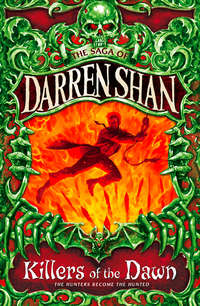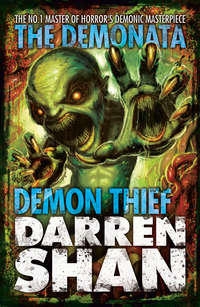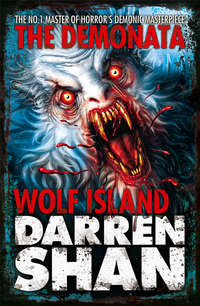
Полная версия
Volumes 1 and 2 - Lord Loss/Demon Thief
“Oh.” He grimaces. “My faux pas. Most people ask about the teens. The photos and portraits are all of dead family members. I like to frame them as they looked at the end of their lives, so most of the photos were taken shortly before the subject’s death. We have a tragic family history – lots of us have been killed young – which is why there are so many pubescents up there.”
He wipes around his mouth with a napkin, carefully balls it up and lays it aside. “As for why Sharon hasn’t been included, it’s simple—no in-laws. Everybody on those walls is a blood relative. It’s a family tradition. But I’ve lots of photos of her, as well as Cal and Gret, in albums that you’re free to browse through.”
“Maybe later,” I smile. “I just wanted to make sure you didn’t have any underhand reasons for not including us with the others.”
“Everything’s above board with me, Grubbs,” Dervish says, then sups from his mug of coffee without taking his eyes off me. “Well—almost everything.”
→Late. Close to midnight. In my pyjamas. No slippers—I left my old pair at the hospital and I forgot to buy new ones today. The stone floor’s cold. I have to keep moving my toes to keep them warm.
I’m drawn back to the hall of portraits. Studying them in moonlight, the faces mostly concealed by shadows. Focusing on the teenagers. Dozens of them, all my age or slightly older. Wondering why the faces of the dead teens fascinate me, and why I feel uneasy.
I’m back in my room, in bed, before the answer strikes and drives all hope of sleep away in a flash. In the restaurant, Dervish didn’t simply say that many of our family members had died young—he said they’d been killed.
SPLEEN
→Settling in. Daily chores—washing-up after meals, sweeping a different couple of floors each day, polishing the furniture in one of the large halls or rooms. Lots of other, less regular jobs—taking out the garbage, cleaning windows, running errands in the village.
I enjoy the work. It keeps me busy. Not much else to do here apart from play chess with Dervish, watch TV – Dervish has a massive 55 inch widescreen set, which he hardly ever uses! – and read. Chess doesn’t thrill me—Dervish is like Mum and Dad, a chess fanatic, and beats me easily each time we play. I’d as soon not play at all, but he gently presses me to work on my game. I don’t get my family’s obsession with chess, but I guess I’ll just have to bear it here like I did at home.
I read more than I normally do – I’m not big on ‘litrachoor’ – but Dervish doesn’t have a great collection of modern fiction. I pick up a few new books in the Vale, and order some more over the Internet, but I’m not spoilt for choice. I try some of the thousands of occult books littering the shelves, figuring they’ve got to be better than watching the moon all night, but they’re too complicated or densely written to be of interest.
So that leaves me with the TV—an endless stream of soap operas, chat shows, movies, sitcoms, sports programmes. And while I never thought I’d admit such a thing, TV does get a bit boring after a while, if it’s all you have to keep yourself amused.
But, hey, it’s a million times better than the institute!
→A week passes. At ease with the house. Getting to know Dervish, though he’s a hard one to figure. Kind, thoughtful, caring—but aloof, with a warped sense of humour. He came in one day while I was watching the news. Caught a report about a serial killer who’d chopped off and collected his victims’ heads. Commented drily, “There’s a man determined to get ahead in life.” Spent the next five minutes doubled over with laughter, while I gazed at him, astonished, and the TV broadcast pictures of bloodbaths and weeping relatives.
His thirst for chess is at least equal to that of Dad and Mum, if not more so. He went easy on me to begin with, gently encouraging me to play, treating the games as fun. Now he’s showing his true colours. Insists that I play with him every night and gets irritated when I play badly.
“You’ve got to love the game,” he told me last night, tossing a captured rook at me with unexpected force. “Chess is life. You have to love it as you love living. If you don’t…”
He said no more, just stormed out of the room, leaving me at a loss for words, rubbing my cheek where the rook struck. Later, when I’d recovered and was passing him in the hall on my way to bed, I muttered, “Get a life, you freak!” The perfect comeback—just an hour too late.
He’s got no time for music. I find a grand total of three CDs in the house, all old albums by some group called Led Zeppelin. Doesn’t read fiction. Watches only the occasional documentary on TV. Spends a lot of time on the web, from what I’ve seen when I’ve visited him in his study. But he doesn’t seem to surf or play games—he mostly exchanges e-mails with contacts around the globe, or visits dull-looking encyclopaedic sites.
Apart from his books and antiques, chess and jogging, and his e-mail mates, he doesn’t seem to have any hobbies, or any apparent interest in the world beyond this house.
→There are stables – long abandoned – behind the mansion. I’m exploring one of them, idly toeing through the old nails and horseshoes on the ground in search of some interesting nugget, when somebody raps on the rotten door and startles me out of my skin.
“Peace, hombre,” the stranger chuckles as I duck and grab a horseshoe for protection. “I come to greet you, not to eat you—as the cannibal said to the missionary.”
A boy a year or so younger than me enters and sticks out his hand. I stare at it a moment, then shake it. He’s a lot shorter than me, chubby, with black hair and a lazy left eye which hangs half-closed. Wearing a faded pair of jeans and an old Simpsons T-shirt.
“Bill-E Spleen,” he says, pumping my hand. “And you’re Grubbs ‘don’t call me Grubitsch!’ Grady, right?”
“Right,” I grin thinly, then repeat his name. “Billy Spleen?”
“Bill-E,” he corrects me, and spells it out. “Actually, it’s really Billy,” he confesses, “but I changed it. I haven’t been able to do it by deed poll yet, but I will when I’m older. There’s nothing wrong with Billy – it’s a hell of a lot better than Grubitsch or Grubbs! – but Bill-E sounds cooler, like a rap star.”
He talks quick and sharp, fingers dancing in the air to accent his words.
“Are you from the village?” I ask politely.
“Yup—I’m a Valer,” he yawns, as though it’s the dullest thing in the world. “I used to live a few miles over – in a cottage smaller than this stable – until Mum died. Then I moved in with my grandparents—‘the original Spleens,’ as Mum used to call them. They’re OK, just a bit old-fashioned and strait-laced.”
Bill-E studies the disturbed nails and horseshoes on the ground and grins. “You won’t find any gold here,” he chortles. “I’ve been through these sheds more times than I can count, looking for old Lord Sheftree’s treasure.”
“Treasure?” Bill-E’s a little too chummy for my liking – I’ve never been fond of people who come along and immediately start acting as though you’re old friends – but I don’t want to say anything to insult him, at least, not until I know a bit more about him.
“You don’t know about the treasure?” He hoots as though I’ve admitted I didn’t know the world was round. “Lord Sheftree – he owned this place years ago – is supposed to have hidden cases full of treasure somewhere on these grounds. His getaway stash, in case he ever had to make a quick exit and needed some ready cash. He was a real swindler. He used to keep a fish tank full of –”
“–piranha,” I interrupt. “And he fed a baby to them. I know.”
“Dervish told you?” Bill-E looks disappointed. “I love telling that story. Just about everyone in Carcery Vale knows it, so it’s not often that I have the chance to break it to someone new. I’ll kick Dervish’s ass for spoiling it for me.”
“Excuse me,” I mutter, exasperated, “but who the hell are you and what are you doing here?”
Bill-E blinks. “No need to speak to me like that,” he sniffs. “I’m only trying to be friendly.”
“And I just want to know who you are,” I respond coolly. “You come in here, telling me your name and that you know all about me, but I’ve never heard of you before. Are you a relative of Dervish’s? A paperboy? What?”
“Paperboy!” he snorts. “I don’t think Dervish ever bought a paper in his life! If it doesn’t come bound in leather or bat’s wings, packed full of spells and dark incantations, he isn’t interested!”
Bill-E steps to the left, into the light shining through a hole in the roof. “I’m no relative,” he says. “Just a friend. I hang out with Dervish, play chess with him, do some odd jobs. He takes me for rides on his bike in return, and teaches me some spells. Has he taught you any spells yet?”
I shake my head.
“They’re cool,” he grins. “I don’t know if most of them really work, but the words you use are wicked. I feel like a real magician when I’m casting them.”
“Could you teach me some?” I ask.
“No,” Bill-E answers promptly. “That’s the first thing Dervish taught me—only a teacher is allowed to teach. He says if he ever catches me passing on my spells to anybody, he’ll can the lessons and ban me from coming here. And he means it—Dervish isn’t the sort to yank your chain about stuff like that.”
I’m warming to Bill-E Spleen – I like the way he talks about Dervish – but it’s been a while since I made a new friend, so instead of saying something simple, I find myself asking cynically, “Did Dervish tell you to come chat to me? Are you supposed to be my new best friend?”
Bill-E sneers. “My friendship can’t be bought or bartered. I usually come over a few evenings every week and at weekends. Dervish asked me to stay away this week, to give you a chance to settle in. I was looking forward to checking you out and showing you around the Vale – as a fellow orphan, I thought we might have stuff in common – but now I don’t think I’ll bother. You’re a bit too up-your-own-ass for my liking. I’ll just go see Dervish and leave you to scurry around out here on your own.”
Bill-E turns to leave in a huff.
“When did your mum die?” I ask quietly.
He stops and squints at me. “Nearly seven years ago. I was just a kid.”
“And your dad?”
He smiles crookedly. “I never knew him. Don’t even know who he was. He’s still alive – I think – so I’m not an official orphan. But I’ve felt like one since Mum died.”
“My folks only died a few months ago,” I say. “It still hurts. A lot. So if I act like a spazz, sorry, but that’s just the way I feel right now.”
Bill-E’s features soften. “When my mum died, I didn’t speak to anyone except Gran and Grandad for almost a year. If other kids came near, I’d scream and attack them. Their parents stopped them hitting back. One day, in a shop, I tried it on a kid when there was nobody around—he knocked the crap out of me. I was fine after that.”
I offer my chin. “Take a pop if you want.”
Bill-E pads over, makes a fist, then taps my chin lightly. “Come on,” he laughs. “Let’s go see what whirling Dervish is up to.”
→The study. Dervish and Bill-E catching up. Lots of names I don’t recognise. Bill-E talking about school, looking forward to the summer break. Dervish telling him about a new book on Bavarian sorcerers which he bought off the web.
“What about the eye spell?” Bill-E asks. He looks at me and points to his lazy left eye. “I’m supposed to have this operated on in a few years, but I’m sure Dervish can conjure up a spell to spare me the hassle.”
“I’ve asked around,” Dervish laughs, “but the great magicians of yore didn’t bother much with drooping eyelids. Besides, magic shouldn’t be used for personal gain, Billy.” Dervish always refers to Bill-E as Billy. I guess he’s known him so long, he finds it hard to change.
“Tell that to great-great-wotsits Garadex!” Bill-E snorts. “He used his magic to make millions, didn’t he?”
“Bartholomew Garadex was an exception,” Dervish says.
Bill-E treats the study as though it’s his own. Pulls books out and only half-pushes them back. Shoves Dervish out of the way to go surfing on the web. Opens a drawer in the desk to show me the skull of a genuine witch, “burned at the stake for casting lascivious spells on the virile young men of the community,” he informs me, waving it around in front of his face, poking his fingers into its empty sockets. Dervish lets Bill-E do as he pleases. Sits back and smiles patiently.
“He’s not normally this wound-up,” Dervish remarks when Bill-E goes to the toilet. “Your arrival upset him. He’s used to having the run of the house. I think he’s worried that things are going to change now that you’ve moved in.”
“Why does he come here?” I ask.
“His mother and I were friends,” Dervish says. “She died in a boating accident, leaving Billy in the care of his grandparents.” He pulls a face. “All I’ll say about that pair is they’re aptly named—Spleen! A more cantankerous old couple you couldn’t imagine. I felt sorry for Billy, so I started visiting and taking him out on my bike. Ma and Pa Spleen weren’t too keen – they still do everything they can to stop him coming over here – but persistence is something I’m good at. I tend to get my own way when I really want to. The odd persuasion spell helps.” He winks. I can’t tell if he’s serious or joking.
Bill-E returns, shaking water from his hands. “No towels, Derv,” he grumbles.
Dervish raises an eyebrow at me. “Fresh towels are your department, aren’t they, Master Grubbs?”
“Sorry,” I grimace. “I forgot.”
“If I was you, Mr Grady, sir, I’d sack ’im,” Bill-E says with relish, then laughs and asks Dervish to teach him a new spell.
“Will I make the two of you disappear?” Dervish asks innocently.
“Yeah!” Bill-E gasps, face lighting up—then curses as Dervish shoos us out of the room and slams the door shut behind us.
→The hall of portraits. Bill-E knows the faces and names off by heart. Giving me a lecture, filling me in on my family background. I listen with pretend politeness, only paying attention to the occasional juicy snippet.
“Urszula Garadex—pirate,” Bill-E intones, tapping the frame of a large canvas portrait. The woman in the picture only has one eye, and three of her fingers are missing, two on her left hand, one on her right. “A cut-throat. Utterly merciless.
“Augustine Grady. Servant to some prince or other. Cause of death—he got kicked in the head by a horse.
“Justin Plunkton—a banker. Nothing interesting about him.”
And so on.
After a while I ask Bill-E about the teenagers and if he knows how they died.
“Dervish doesn’t say much about them,” he replies. “I think it’s some ancient family curse. You’ll probably go toes-up any day now.”
“I’ll try hard to take you with me,” I retort.
We come to Dad and Gret. Bill-E pauses curiously. “These are new. I don’t know who –”
“My dad and sister,” I inform him quietly.
He winces. “I should have guessed. Sorry.” He looks at me questioningly, licks his lips, stares back at the photos.
“An unasked question is the most futile thing in the world,” I prod him.
“That’s one of Dervish’s sayings,” he notes. Licks his lips again. “Do you want to tell me how they died, or is it a secret? I asked Dervish, but he won’t say, and Gran and Grandad don’t know—nobody in the village does.”
My stomach tightens. Flashes of a crocodile-headed dog, a hell-child, their eerie master. “They were murdered.”
Bill-E’s eyes widen. His lazy left eyelid snaps up as though on elastic bands. “No bull?” he gasps.
My expression’s dark. “No bull.”
“Do you know who did it?”
“I was there.”
Bill-E gulps deeply. “When they were being killed?”
“Yes.”
“How’d you get away?”
I consider how much I should tell him. Decide to try him with the truth. “They were murdered by demons. I escaped using magic.”
He frowns. “If this is a joke…” Stops when he sees my face. “Does Dervish know?”
“Yes.”
“He believes you?”
“Yes. But he’s the only one. Everybody else thinks I’m making it up.”
Bill-E grunts dismissively. “If Dervish believes you, so do I.” He turns from the photos and does an odd little shuffling dance, mumbling weird words.
“What was that for?” I ask, bemused.
“One of Dervish’s spells,” he says. “It makes the dead smile. Dervish says it’s important to keep the dead happy. The reason this house isn’t haunted is that Dervish keeps its ghosts laughing.”
“Rot!” I bellow.
“Maybe,” Bill-E grins. “But I’ve been dancing for years and never been bothered by ghosts. Why stop now and run the risk?”
→We watch MTV on the 55 inch widescreen TV, munching popcorn, drinking coke from tall paper cups just like in the cinema.
“The TV was my idea,” Bill-E brags, the remote control balanced on his left knee. “Dervish resisted to begin with, but I kept on at him and eventually he bought one.”
“Does he always cave in to your demands?” I ask.
“No,” Bill-E sighs. “I can wrap Gran and Grandad round my little finger, but Dervish doesn’t crumple. He got the TV because I convinced him it was a good idea—his guests would get good use out of it even if he didn’t.”
“You and Dervish are close, aren’t you?” I note.
“Step aside, Sherlock Holmes—there’s a new kid in town!” Bill-E chuckles, rolling his eyes.
“I don’t want to… like… get between you… or anything,” I mumble awkwardly.
“You couldn’t if you tried,” he responds smugly.
“I could!” I bristle. “He’s my uncle.”
“So?” Bill-E laughs. “He’s my father!”
I stare at him, stunned.
Bill-E looks sheepish. “I shouldn’t have said that,” he mutters. “You won’t tell him, will you?”
“No… but… I mean…” I catch my breath. “You said you didn’t know your father!”
“I don’t,” he says. “Not officially. But it hardly takes a genius to work it out. He wouldn’t invite me over and make such a fuss of me if we weren’t related. And Gran and Grandad Spleen wouldn’t tolerate his involvement unless they had to, no matter how close a friend of Mum’s he was. Dervish has to be my dad. It’s logic.”
“Have you ever asked him?”
Bill-E shakes his head instantly. “Why spoil it? We get along great the way we are. If the truth ever came out in the open, he might decide to sue for custody.”
“Wouldn’t you like that?” I ask.
He shrugs. “I wouldn’t miss Gran and Grandad that much if I moved in with Dervish,” he admits. “I could still go and see them all the time. But if he lost, they might take out a court order to stop him seeing me. I reckon they struck a deal with him when Mum died—he could carry on visiting, or having me over to visit, as long as he never told me who he really was. If I go messing about, it might screw up everything.”
I scratch my head, thinking that over. It all seems a bit complicated to me—Dervish doesn’t strike me as the sort to go in for such subterfuge. But I’m new on the scene. Bill-E has spent most of his life around my uncle. I guess he knows what he’s talking about.
“This makes us cousins—if it’s true,” I note.
“Yeah,” Bill-E giggles, then pokes me in the chest. “It also makes me his son and rightful heir, so don’t go getting too attached to this place, Grady, because as soon as the old man kicks it, you’re out of here!”
“Charming!” I laugh, and dump the last of my popcorn over Bill-E’s head.
“Hey!” Bill-E shouts, shaking kernels from his head, all over the couch and floor. “Clean that up!”
“You clean it,” I grin wickedly. “It’s your house…”
Both of us laughing, he chases me up the stairs to my room, lobbing fistfuls of popcorn at my head all the way.
CARNAGE IN THE FOREST
→Routines. Daily chores. Lots of chess competitions with Dervish and Bill-E. Dervish taught Bill-E how to play. He’s much better than I am, though his concentration wanders occasionally, so I beat him more than I should. Watching TV. Hanging out with Bill-E. We play football and explore the countryside when we’re not stuck in front of the massive screen or locking horns in chess tournaments.
I’m recognised in Carcery Vale now. Bill-E introduced me to the shopkeepers and gossips. They accept me the same as any other kid. Pass the time of day with me when I come in to pick up shopping. Ask about Dervish and what I think of the mansion. Tell me tales from its gory past, trying to spook me.
Bill-E also takes me to visit Gran and Grandad Spleen. A couple of battleaxes! Narrow-eyed, sharp-tongued, drably dressed, their house in a state of perpetual gloominess. Grandad Spleen rambles on about the old days and how Carcery Vale has gone to the dogs. Grandma Spleen hovers in the background, serving tea and biscuits, eyes daring me to spill crumbs on her carpet.
Both have lots to say about Dervish, none of it good.
→Not right, living out there on his own.
→A house like that’s too big for one man.
→He should be married—but no one will have him!
→If he does anything out of order, you let us know.
Bill-E smiles apologetically when we leave. “I love my grandparents, but I know what they’re like. I won’t take you there too often.”
I shrug as if it’s no big deal, but offer up silent thanks. I don’t know how he sticks them. I’d have run away from home years ago if I was caged in with a crabby old pair like that! Although, thinking twice about it, I suppose it’s better to have grumpy grandparents as parents than no parents at all. I complained a lot about Mum and Dad when they were… still with me. They had their faults. I think everybody does. But I wouldn’t complain if they were with me… alive now.
The murders are never far from my thoughts. The memories of Vein, Artery and Lord Loss haunt me. Many nights I wake screaming, arms thrashing, eyes wild, imagining demons in the room with me, under the bed, in the wardrobe, scratching at the door.
Dervish is always there when I wake from my nightmares. Sitting by the bottom of my bed. Passing me a mug of hot chocolate or a towel to wipe the sweat from my face. He never says much, or asks what I was dreaming about. Leaves as soon as I’ve settled down.
We haven’t discussed the demons. I think Dervish wants to, but I’m reluctant to step back into that world of darkness. He leaves books in my room, or open on the tables downstairs, about monsters, demons, magic. I avoid them at first. Later I read certain passages and study pictures, attracted to the mystery of this other realm despite my fear of it.
No pictures of my demons in the books. I glance through some of the many encyclopaedias in the mansion, but there’s no mention of a Lord Loss or his familiars in any of them.
→Friday. Listening to CDs I bought in the Vale. A roaring outside, of a motorbike approaching. But it isn’t Dervish—he’s up in his study. I creep to the window and secretly watch the cyclist dismounting. A woman dressed in black leather. Long blonde hair tumbles down over her shoulders when she removes her helmet. She stretches, hands going high above her head. Ay carumba!
I’m down the stairs in a flash, but not as fast as Dervish. He’s already opening the front doors. I catch a glimpse of a big smile. Then he’s shouting, “Meera! I wasn’t expecting you for another few days. Why didn’t you phone?”
“You never answer,” the woman says, meeting Dervish in the doorway, hugging him hard. She pushes him away and studies his face. “How’s it going, hon?”
“Not bad,” Dervish chuckles.
“How’s the lodger?” She spots me over Dervish’s shoulder. “Oh, never mind, I’ll ask him myself.” She strides over and offers her hand. I shake it politely. “Meera Flame,” she introduces herself. She smiles—dazzling. “And if I know Dervish, he hasn’t told you a thing about me, right?”
I nod dumbly. I think I’m in love!


